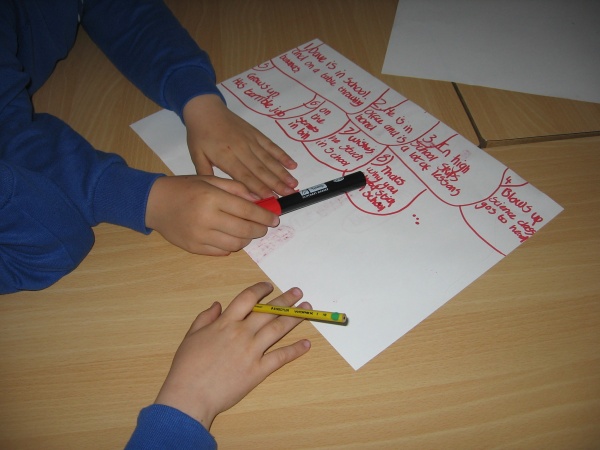 Yvonne McBlain from the Curriculum Support team is working with groups of pupils and their teachers to create the pupil version of Learning to Achieve, Falkirk’s education policy. Christine Snedden and Yvonne have been working with pupils and pupil council members for a while, to create the draft version of this policy. Groups of teachers and their pupils have now volunteered to turn this text document into something digital like a video or animation. John Chalmers primary 5 class at Grange Primary brainstormed ways that they could bring each bullet point to life. Click here to see some of their initial ideas – most groups thought about making drama performances which could be filmed. The animation club run by Sarah Ritchie at Bonnybridge Primary spent most of an afternoon coming up with ideas for animations which could bring each bullet point to life. Click on the photos to take a closer look at their initial ideas. Yvonne was very impressed by the way all of the pupils began this task – they quickly understood the message and content of the policy text in the document and made very clever judgements about how best to get their message across to fellow pupils. When these ideas are turned into a digital multi-media policy, the senior pupil council have suggested that this is shared with all pupils and staff working in education services at a launch assembly in every school, sometime in October.
Yvonne McBlain from the Curriculum Support team is working with groups of pupils and their teachers to create the pupil version of Learning to Achieve, Falkirk’s education policy. Christine Snedden and Yvonne have been working with pupils and pupil council members for a while, to create the draft version of this policy. Groups of teachers and their pupils have now volunteered to turn this text document into something digital like a video or animation. John Chalmers primary 5 class at Grange Primary brainstormed ways that they could bring each bullet point to life. Click here to see some of their initial ideas – most groups thought about making drama performances which could be filmed. The animation club run by Sarah Ritchie at Bonnybridge Primary spent most of an afternoon coming up with ideas for animations which could bring each bullet point to life. Click on the photos to take a closer look at their initial ideas. Yvonne was very impressed by the way all of the pupils began this task – they quickly understood the message and content of the policy text in the document and made very clever judgements about how best to get their message across to fellow pupils. When these ideas are turned into a digital multi-media policy, the senior pupil council have suggested that this is shared with all pupils and staff working in education services at a launch assembly in every school, sometime in October.
Tag: creativity
Creative Conversation with Paul Collard
Gayle Martin, Arts & Culture Offiicer, Curriculum Support Falkirk Council Education has been working in partnership with Clare Hoare at Stirling Council to develop Creative Conversations. The lastest event was led by Paul Collard. Paul has over 25 years experience of working in the arts and is an expert in delivering programmes that use creativity and culture as drivers of social and economic change. He joined the U.K government’s flagship creative learning programme, Creative Partnerships in January 2005 and played a crucial role in clarifying the purpose of Creative Partnerships and streamlining the delivery of the programme in schools. Paul delivered our latest Creative Conversation ‘How do we Capture & Measure Creativity’ on Wed 17th April at the Tollbooth.
Throughout the session Paul discussed how to identify and recognise creativity in order to measure. As part of the Creative Partnerships work in England Cambridge University carried out research examining the pedagogy of creative practice, as part of this they outlined the following:
Pupils need risk for motivation – this gives learners incentive to work. Schools can be too low risk – pupils need high visibility outcomes. High functioning pupils will be physically, socially, emotionally and intellectually engaged equalling high performance pupils.
Other Creative indicators are:
Essential Psychological Needs
Key Ingredients
Defining Creativity
Creativity – What Is It?
Gayle Martin, Arts & Culture Officer, Curriculum Support Falkirk Council is working in partnership with Stirling and Clackmannanshire Council to develop Creative Learning. Gayle recently attended a presentation by Sheila Paige of Education Scotland who is leading Creativity Across Learning, which is a creative review across a range of education establishments in Scotland. The review will complete in June and results will be published in September. As part of this Sheila was able to share how Education Scotland has defined Creativity, which is listed below:
Definitions of Creativity
Creative skills, sometimes referred to as capacities, include being:
- Inquisitive
- Open-minded
- Able to harness imagination
- Able to identify and solve problems
We also define people who have well-formed creative skills as being:
- Confident in their right and ability to influence change
These organisers are used to describe more fully those key learning behaviours which will support the development of these skills and capacities. The following list aims to expand these concepts. It is not exhaustive but includes:
- Being curious
- Registering patterns and anomalies
- Drawing on previous knowledge
- Researching productively
- Formulating good questions
- Defining problems
- Exploring multiple viewpoints
- Functioning with uncertainty
- Lateral thinking
- Hypothesising
- Synthesising and refining multiple options and viewpoints
- Inventing
- Crafting, delivering and presenting solutions
- Applying discipline and resilience
- Evaluating impact and success of solutions
- Identifying next steps in refinement or development of process
We would also expect children and young people to become increasingly:
- Motivated and ambitious for change
- Confident in validity of their own viewpoint
- Able to apply a creative process to other situations
- Able to lead and work well with others








